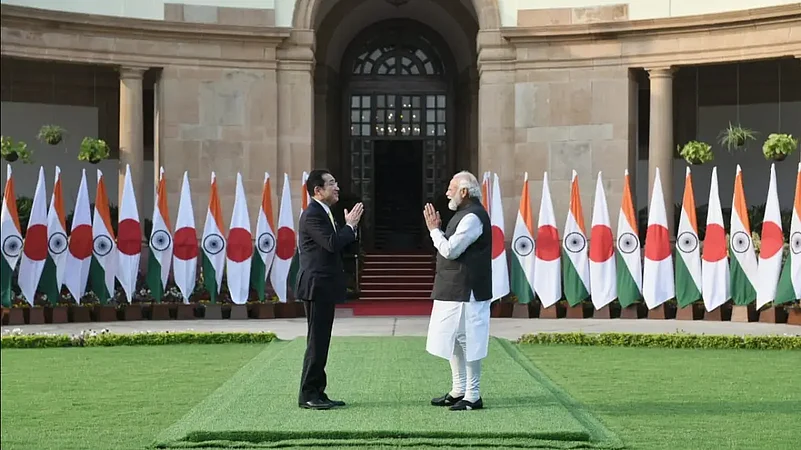The big take-away from Prime Minister Fumio Kishida’s visit to New Delhi is the announcement of a whopping Rs 3.2 lakh crores, approximately $42 billion dollar Japanese investment plan, in India spread over the next five years. This was announced after talks between Prime Minister Narendra Modi and his Japanese counterpart in Hyderabad House on Saturday.
Ukraine and the impact of Russia’s war in Europe were discussed at length. Here, New Delhi is not on the same page as either Japan or other members of the Quad -- the US and Australia. India, looking to its strategic compulsions, has maintained a neutral stand in the ongoing conflict, while Japan has followed the US and Australia in roundly condemning Russian aggression and imposing sanctions on Russian companies.
India as an old friend of Russia has not publicly condemned President Vladimir Putin’s action and has taken a neutral stand at the UN Security Council. What is more, New Delhi is toying with the idea of buying Russian oil offered at a concessional rate by paying not in dollars but reviving the rupee-rouble payment system. The final decision has not yet been made but with oil prices at an all-time high, India could well take that route.
The divergence was apparent in the press statements read out by both leaders after their meeting. Prime Minister Kishida, in his remarks, spoke out against Russia’s invasion of Ukraine as a "very serious issue which is shaking the roots of international order." He went on to say, "No permission should be given by one side to change the status quo in world order by use of force." All this with Prime Minister Narendra Modi standing by his side. While Japan’s views are well known, articulating it from New Delhi gives it a completely different twist.
Ahead of his visit to India, Kishida was quoted by Reuters as saying, “Since the Russian invasion of Ukraine coincides with this trip, I’d like to emphasise the importance of international unity and confirm that Japan and India will work together on various issues.”
Unlike Kishida, PM Modi did not say a word about Ukraine during his opening remarks. Instead, he concentrated on bilateral ties. What was the tone and tenor of the discussion on Russia’s actions in Ukraine behind closed doors is not known. The joint statement at the end of the visit appeared to largely reflect India’s stand as there was no finger-pointing at Russia:
"The prime ministers expressed their serious concern about the ongoing conflict and humanitarian crisis in Ukraine and assessed its broader implications, particularly to the Indo-Pacific region, this is possibly a reference. They emphasized that the contemporary global order has been built on the UN Charter, international law and respect for sovereignty and territorial integrity of states. They underscored the importance of the safety and security of nuclear facilities in Ukraine and acknowledged the active efforts of the IAEA towards it. They reiterated their call for an immediate cessation of violence and noted that there was no other choice but the path of dialogue and diplomacy for the resolution of the conflict. The Leaders affirmed that they would undertake appropriate steps to address the humanitarian crisis in Ukraine."
Foreign secretary Harsh Vardhan Shringla, at a late evening news conference, presented a sanitised view of the discussions on Ukraine, pointing to the broad similarity in approach. India and Japan both respect the sovereignty and territorial integrity of all nations, Shringla said. Both want an immediate stop to the fighting and are concerned about the safety of nuclear facilities. The humanitarian concerns that the war has raised are paramount and need to be addressed. India had already flown out 90 tonnes of aid to Ukraine as well as to the bordering states taking care of refugees from the conflict zone.
Responding to a journalist, Shringla said that Modi and Kishida talked at length about China. Japan and India face a similar threat perception on China’s aggressive moves across Asia. New Delhi gave a detailed account of what happened in Ladakh and the ongoing military commander level talks between the two sides. Unless peace and tranquillity are restored on the border it cannot be business as usual between the two, Shringla said. The Japanese PM in his turn briefed Modi on the situation around the South and East China Seas.
Meanwhile, six agreements were signed during the summit including on cyber security and green energy.



























